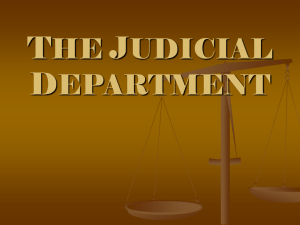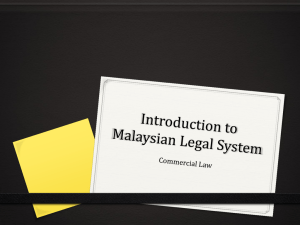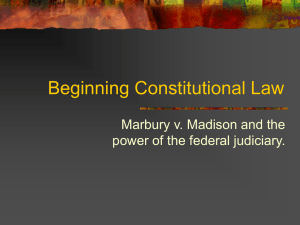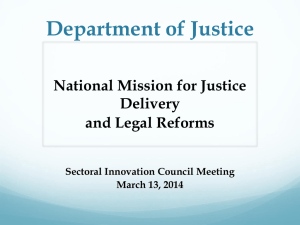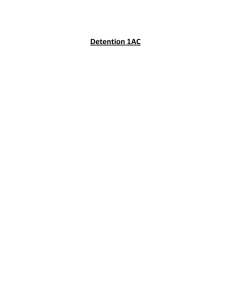23 - American Bar Association
advertisement
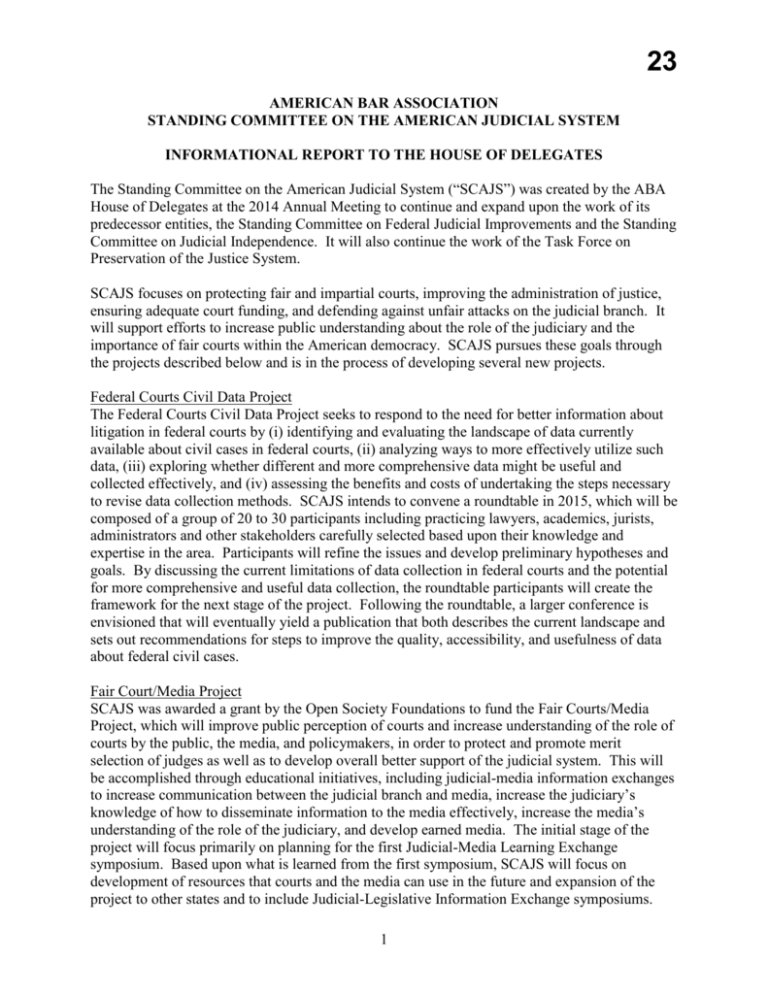
23 AMERICAN BAR ASSOCIATION STANDING COMMITTEE ON THE AMERICAN JUDICIAL SYSTEM INFORMATIONAL REPORT TO THE HOUSE OF DELEGATES The Standing Committee on the American Judicial System (“SCAJS”) was created by the ABA House of Delegates at the 2014 Annual Meeting to continue and expand upon the work of its predecessor entities, the Standing Committee on Federal Judicial Improvements and the Standing Committee on Judicial Independence. It will also continue the work of the Task Force on Preservation of the Justice System. SCAJS focuses on protecting fair and impartial courts, improving the administration of justice, ensuring adequate court funding, and defending against unfair attacks on the judicial branch. It will support efforts to increase public understanding about the role of the judiciary and the importance of fair courts within the American democracy. SCAJS pursues these goals through the projects described below and is in the process of developing several new projects. Federal Courts Civil Data Project The Federal Courts Civil Data Project seeks to respond to the need for better information about litigation in federal courts by (i) identifying and evaluating the landscape of data currently available about civil cases in federal courts, (ii) analyzing ways to more effectively utilize such data, (iii) exploring whether different and more comprehensive data might be useful and collected effectively, and (iv) assessing the benefits and costs of undertaking the steps necessary to revise data collection methods. SCAJS intends to convene a roundtable in 2015, which will be composed of a group of 20 to 30 participants including practicing lawyers, academics, jurists, administrators and other stakeholders carefully selected based upon their knowledge and expertise in the area. Participants will refine the issues and develop preliminary hypotheses and goals. By discussing the current limitations of data collection in federal courts and the potential for more comprehensive and useful data collection, the roundtable participants will create the framework for the next stage of the project. Following the roundtable, a larger conference is envisioned that will eventually yield a publication that both describes the current landscape and sets out recommendations for steps to improve the quality, accessibility, and usefulness of data about federal civil cases. Fair Court/Media Project SCAJS was awarded a grant by the Open Society Foundations to fund the Fair Courts/Media Project, which will improve public perception of courts and increase understanding of the role of courts by the public, the media, and policymakers, in order to protect and promote merit selection of judges as well as to develop overall better support of the judicial system. This will be accomplished through educational initiatives, including judicial-media information exchanges to increase communication between the judicial branch and media, increase the judiciary’s knowledge of how to disseminate information to the media effectively, increase the media’s understanding of the role of the judiciary, and develop earned media. The initial stage of the project will focus primarily on planning for the first Judicial-Media Learning Exchange symposium. Based upon what is learned from the first symposium, SCAJS will focus on development of resources that courts and the media can use in the future and expansion of the project to other states and to include Judicial-Legislative Information Exchange symposiums. 1 23 SecureCourts Initiative At the 2014 Midyear Meeting, the House of Delegates adopted Resolution 106, which urges development and funding of appropriate judicial system security protocols and education of those who participate in the judicial system regarding how to respond to security threats. To implement this policy, SCAJS created the SecureCourts initiative aimed at educating policymakers, courts, bar associations, and those who regularly participate in the judicial system. The SecureCourts initiative seeks to enhance court security, reduce the impact of court related violence, and promote fair and impartial courts. Least Understood Branch The Least Understood Branch (“LUB”) initiative aims to increase public understanding of and respect for the rule of law, the legal process, and the role of the legal profession and the judiciary. LUB also encourages greater public awareness and appreciation of the unique role of courts and the need to maintain an independent and impartial judiciary to fulfill that role and protect the rule of law. SCAJS is focusing its LUB efforts on providing training to bar association and court leaders, and will partner with additional pilot states pursuant to the strategic plan if appropriate venues are identified. In any new pilot states, SCAJS will work with bar association and court leaders to identify specific threats that can be addressed using LUB. Judicial Disqualification Project The Judicial Disqualification Project (“JDP”) seeks to preserve the independence of the judiciary by working to ensure that states have appropriate procedures and guidelines in place regarding judicial disqualification and disclosure. SCAJS continues to explore opportunities to assist states that are interested in revising their rules and procedures and maintains resources regarding disqualification rules and procedures throughout the country that are available to states interested in exploring possible reforms. SCAJS remains committed to the implementation of JDP. Forum on Judicial Independence The Fourth Annual Forum on Judicial Independence at the 2014 Annual Meeting entitled, “How Judges, Lawyers, and the Public are Influenced by Media Coverage of the Courts,” was moderated by Charles Bierbauer, Dean of the College of Communications and Information Studies at the University of South Carolina. Panelists included Massachusetts Bar Association President-Elect Marsha Kazarosian, Wesley Lowery, a journalist at The Washington Post, Chief Justice Lawton R. Nuss of the Kansas Supreme Court, and United States District Court Judge Shira A. Scheindlin. This successful annual Forum will continue at the 2015 Annual Meeting. SCAJS Subcommittees SCAJS’s subcommittees continue to explore issues impacting the judicial system such as professional diversity of federal judicial nominees and the impact of court user fees on access to justice and judicial independence. The Subcommittee on Bankruptcy Issues reports regularly on issues impacting the United States Bankruptcy Courts. Respectfully Submitted, David F. Levi Chair, Standing Committee on the American Judicial System February 2015 2



